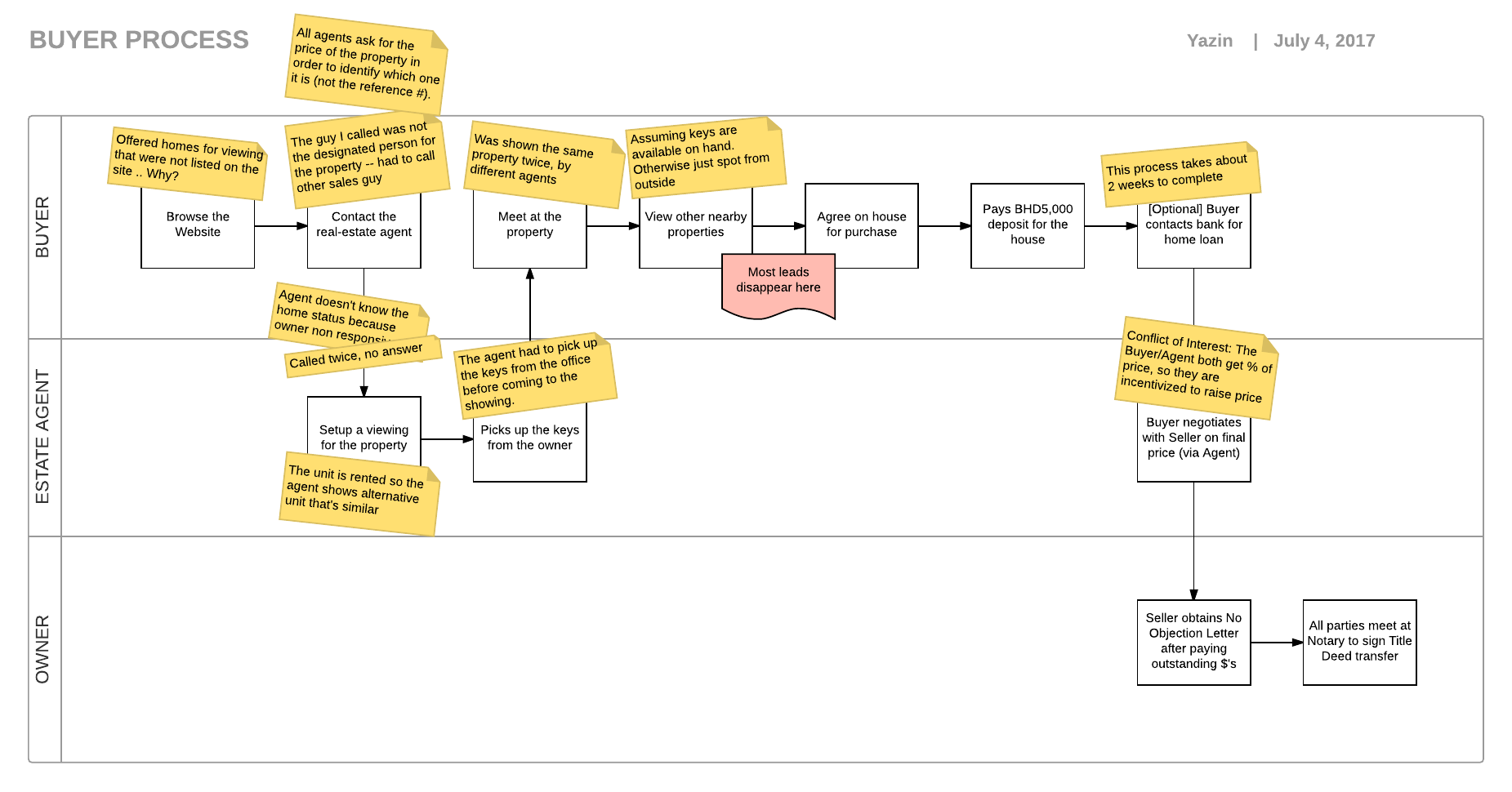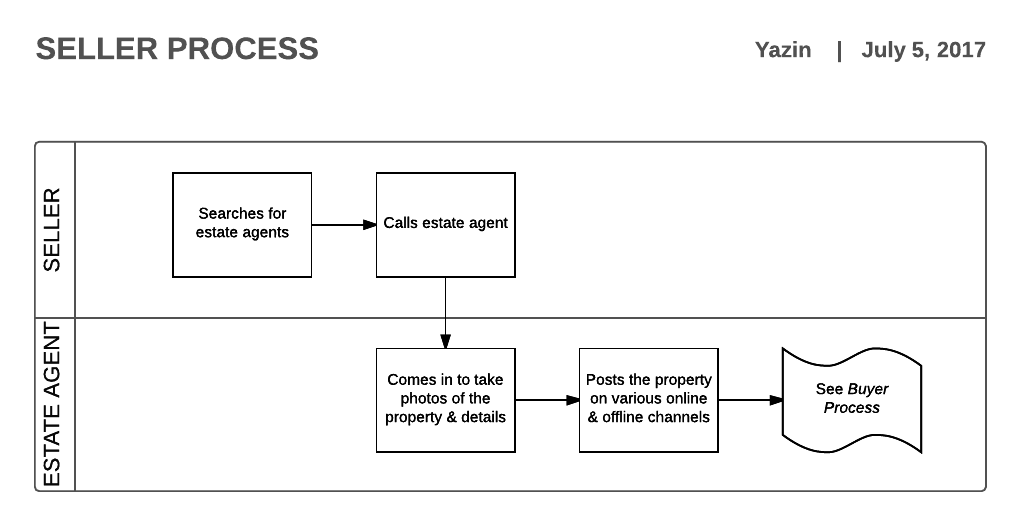Real Estate Idea
This is not a well-defined idea, and I still don’t know what to test — or indeed, whether there’s anything to do here. I do know that people in Bahrain buy & sell real-estate the same way they have in the pre-web era. The only difference is that now there’s a bunch of websites (really, not very different than catalogs, or newspaper classifieds) that advertise properties. The transaction is always initiated via a phone call, followed by a site visit.
There’s certainly room for improvement — but before doing anything, the first step has to be about discovery. Don’t try to fix something you don’t fully understand.
Discovery
There are many ways to understand the “real estate process”; you could ask the agents, people that want to buy a property, or the owners — those are the primary parties involved.
Instead, and because I know very little about the space, I’ll start by attempting to buy a property (masquerading as a buyer). This will allow me to start at the beginning (a buyer shows interest), and then branch out to the other process directions (how did the owner list the property?) and (how does the realtor close the sale).
Oh, and I’ll do this until I feel like I’ve nailed the process (i.e. I can predict exactly what steps the next realtor will follow, to the t). That’ll probably take about 30 tries to do, maybe more. We’ll see…
The Buying Process
I setup viewings for 8 properties with various real-estate agents, and sourced through multiple websites. Here’s a list:
Having gone through all of these viewings, here’s what the buying process looks like visually, with some notes of the things I found odd:
The Selling Process
For this next bit, I call up estate agents this time seeking assistance in selling my house. I then clarify the process after having called several estate agents and figured out a cohesive process map for the selling process.
Here’s the list:
- Seller calls up the estate agent
- Estate agent comes in and takes photos of the property
- Estate agent suggests the price, according to current market conditions
- Once price is decided, the agent posts the property on the various channels (website, etc.)
- If the buyer decides on purchasing the property, a price negotiation is conducted
- If the buyer decided to proceed, they both meet at the notary and sign over the title deed
Deciding on a problem
At this point, I have several candidates for problems to sovle — all of them from notes I picked up during the buying process.
I’ve listed what seem to be the most promising candidates here:
- The issue of handling keys. In the instances I witnessed, the agents either had to drive out of their way to get the keys from someplace, or were just unable to provide the keys at all because they didn’t have them handy. I already have several ideas for solutions, but let’s not get ahead of ourselves.
- Agents ask for the price of the property in order to identify which one you’re talking about. Do they not have an app for this? How do they track their properties? Worth exploring… Also tied to two other issues:
- Offered homes for viewing that were not listed on the site
- The issue where the agent didn’t know the status of the home because the owner was non-responsive.
Next, I need to talk to some real estate agents to see if this is something that might actually fly — since they would be the customer.
I pulled up LinkedIn, and started searching for 1st and 2nd degree connections with people in the real-estate industry, specifically agents and owners of agencies. I also decided to put together a draft to ask a whole list of real-estate agents that I had no relation with. Mind you, this was a list of agencies, not agents — so I’d still have to do a bunch of digging to find the contact details for specific agents. Still, totally doable.
Next, I need a script. Here’s what I used:
Hey [Name]? ⏸ My name’s Yazin, I’m a business student working on a project to help real-estate agents. Could you help answer some questions for me? It’ll only be a few minutes ⏸ Great. Let’s say I was looking to buy a house. How would you look up the details of the property? Do you have some sort of system you use, or is it something more basic? ⏸ Ok, and how does that work if you’re outside the office? ⏸ Great, now my last set of questions are going to be about the keys to the houses on sale. Do the owners usually keep the keys or do you hold on to them? ⏸ Where do you usually keep them? ⏸ What happens if another real-estate agent has a client that wants to see the property? ⏸
Next, I put together the list of agents:
… and started talking!
I was originally planning on speaking to all 55 agents in the list, but I found that the answers were pretty much all the same after #8, so I didn’t see a reason to continue.
I was able to learn that:
Keys problem:
- In most cases, the property keys are kept with the property owners. In the remaining ~20% of cases, they are either kept with property managers, security guard/watchmen or are handed over to the real estate agent (in case of an exclusive arrangement between owner and agent).
- If another agent refers a client, then they split the commission (often down the middle). However, there’s a database of properties for sale/on rent that’s used by many real estates which lists the contact details of the owners. This means that in some cases, the real estate agent with the client can cut out the listing agent and close the deal with the owner directly. It’s unclear how big of an issue this is.
From what I’ve learned, the key problem seems more worthwhile to pursue but it’s obviously not going to be a pure software solution. Some hardware would be needed to grant/revoke access to the property, even if it’s just a lockbox (that project appears to be dead btw, after the owner raised ~$500k from KickStarter & Shark tank).
Systems problem:
- Every agent uses some sort of system (even if that’s just basic Excel for small agencies), but none of them seemed to be aware that there was an issue — nor did they complain about it much.
- There are 12.5 million results on Google for “real estate CRM”.
I also did come along another problem that I hadn’t thought about before:
Competition problem: One thing I picked up from the conversations is that real estate agents have a dim view of other real estate agents — and there’s always a worry that they are going to steal from each other. One particular example is how they don’t share all of the information pertaining to a property on their website, since that would mean other real estate agents might be able to see it too (and copy it). Of course, the more real estate agents know about a property, the more likely a buyer will end up seeing it, and the more likely it’ll get sold. However, real estate agents are not incentivized to work together, but work against each other in order to make a (commission-based) living. It is strange that things like address and nearby points of interest are hidden to prevent this “theft” from taking place. This means that the customer can’t know the exact location of the property without first contacting the estate agent. Additionally, it means that if he/she wanted to view mutliple properties in the same location — they’d need to coordinate with multiple agents and hope that they can line them all up in the same window. This is a sucky situation for all the parties involved: propspective buyer, agent and the seller. The only parties you really need in order to execute a buy/sell agreement is the buyer and the seller — the agent’s role should be to add value as a middleman, not get in the way.
So to take a step back, let’s consider the value proposition of using an agent in the first place:
- They can do viewings for the owner, so the owner doesn’t have to show up to the property every time a prospective buyer comes by.
- They (supposedly) help find buyers. I say supposedly, since many people today seem to find properties (either via one of the many websites in existence, or by just passing by a property with a sign).
And the downsides…
- They take a fee from both the seller (~2%) and the buyer (1%)
- They don’t always have the best interest of the buyer OR the seller at heart. Since they get paid a % of the sale price, their goal is to maxmimize that price. That’s obviously bad for buyers, but it’s also bad for the seller if they’re looking to sell on some sort of timeline (and not wait forever).
- Their scattered nature means that you often have to talk to mulitple agents to see a group of properties in the same location (no one agent has access to all of the properties; they might not even be aware of all of them in the first place).
My first impression is: wow, that’s nuts. I mean, there’s got to be more to what estate agents do than just (literally) unlocking doors and putting up signs! Maybe there’s some psychological element I’m overlooking — a sense of security knowing that you’re dealing with someone who’s sold tens of houses before and know’s what they’re doing. Yeah, may be. Still, it seems really overpriced for what you’re getting.
My first impression is: before I cross them off as useless, it’s a good idea to get in their shoes for a while… see what it feels like to actually get people to buy/rent a property, and then figure out whether they do indeed add value or not.
Note: I’m working on a side-project so this’ll be on hold for a few days while I see what transpires with the other idea. Expect an update on Wed, 19th July.
Update (28/July): Ok, so the other project took longer than I expected, and is already underway. It hasn’t concluded yet (it’ll take about a month from today), but it won’t take up as much time from me as it did these past 2 weeks. I’ll be continuing with this project from the 4th of August, once I’m back from a quick trip.


